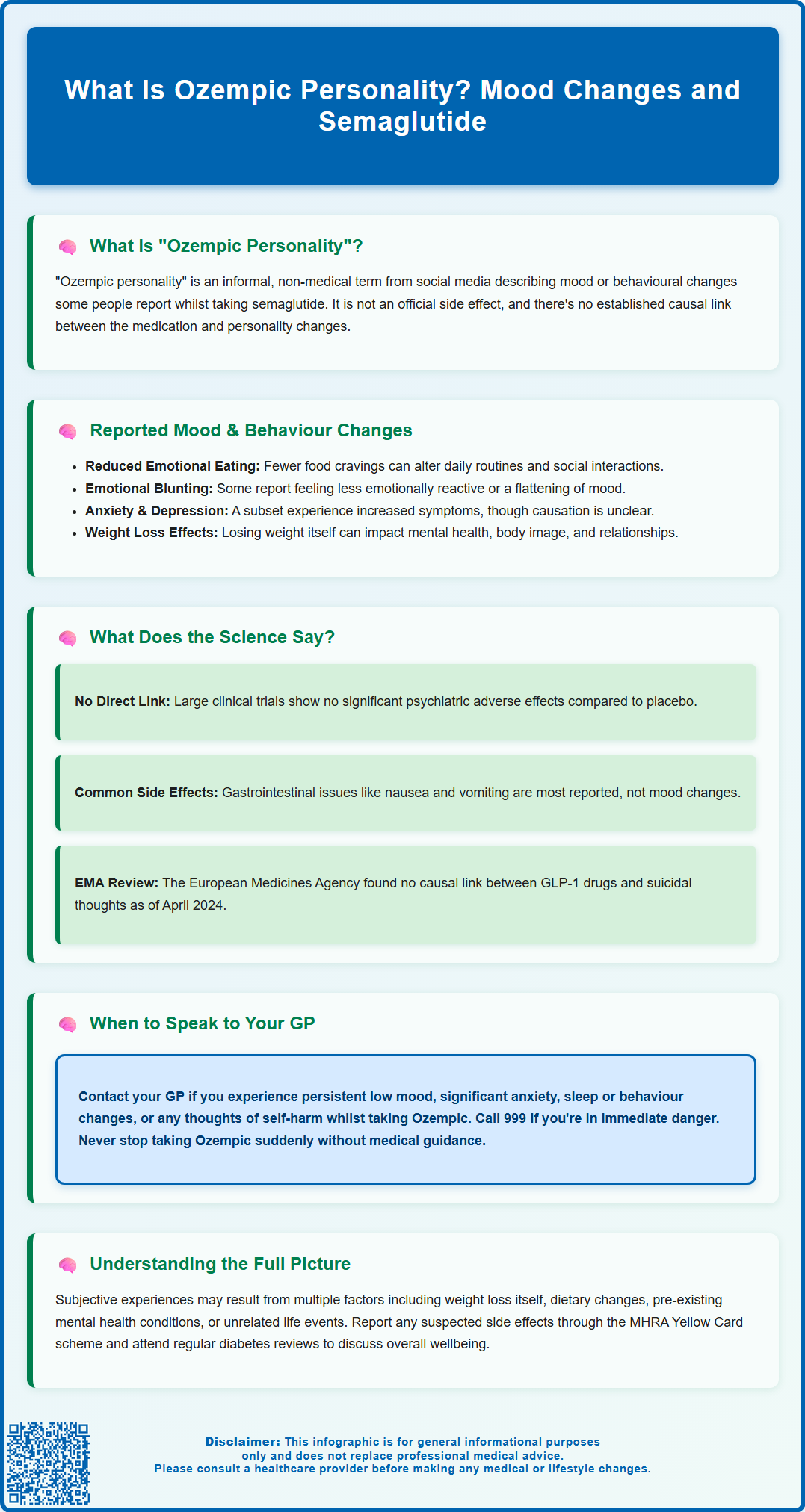'Ozempic personality' is an informal term circulating on social media, describing perceived mood or behavioural changes some individuals report whilst taking Ozempic (semaglutide), a GLP-1 receptor agonist licensed in the UK for type 2 diabetes management. This is not a recognised medical diagnosis or an official adverse effect listed by the MHRA. Reports are anecdotal and vary widely, including altered emotional eating patterns, mood flatness, or changes in social behaviour. The European Medicines Agency found no causal link between GLP-1 receptor agonists and suicidal thoughts in April 2024. Understanding these reports requires careful consideration of multiple factors, including weight loss effects and underlying mental health conditions.
Summary: 'Ozempic personality' is an informal, non-medical term describing anecdotal mood or behavioural changes some patients report whilst taking semaglutide for type 2 diabetes.
- Ozempic (semaglutide) is a GLP-1 receptor agonist licensed by the MHRA for type 2 diabetes management in the UK.
- Reported changes include reduced emotional eating, mood flatness, altered social behaviour, and shifts in anxiety levels, though these are anecdotal and not universal.
- No robust scientific evidence establishes a causal link between semaglutide and personality changes; clinical trials have not identified this as a significant adverse effect.
- The EMA concluded in April 2024 that there is no causal association between GLP-1 receptor agonists and suicidal or self-injurious thoughts.
- Weight loss itself can profoundly affect psychological wellbeing, making it difficult to separate drug effects from weight reduction effects.
- Patients experiencing persistent mood changes, anxiety, or low mood should discuss these with their GP; do not stop Ozempic without medical advice.
Table of Contents
What Is Ozempic Personality?
'Ozempic personality' is an informal term that has emerged on social media and in patient forums to describe perceived changes in mood, behaviour, or emotional responses that some individuals report whilst taking Ozempic (semaglutide). This medication is licensed in the UK by the MHRA for type 2 diabetes management and belongs to a class of drugs called glucagon-like peptide-1 (GLP-1) receptor agonists. It's important to note that Ozempic is distinct from Wegovy, which is the semaglutide product specifically licensed for weight management in the UK.
The term itself is not a recognised medical diagnosis or an official adverse effect listed in the Summary of Product Characteristics. Rather, it reflects anecdotal observations from patients who describe feeling different emotionally after starting treatment. Reports vary considerably and include:
-
Reduced emotional eating or changes in food-related reward responses
-
Altered mood states, including feelings of flatness or reduced enthusiasm
-
Changes in social behaviour or interest in activities previously enjoyed
-
Shifts in anxiety levels or emotional reactivity
It is important to emphasise that there is currently no established causal link between semaglutide and personality changes. The European Medicines Agency's Pharmacovigilance Risk Assessment Committee (PRAC) concluded in April 2024 that there is no causal association between GLP-1 receptor agonists and suicidal or self-injurious thoughts, though monitoring continues. The experiences described are subjective and may be influenced by multiple factors, including weight loss itself, dietary changes, underlying mental health conditions, or coincidental life circumstances.
Reported Mood and Behaviour Changes with Ozempic
Patients using Ozempic have reported a spectrum of mood and behavioural changes, though these experiences are highly individual, anecdotal, and not universal. Some describe a reduction in food-related thoughts and cravings, which can alter daily routines and social interactions centred around eating. For individuals whose emotional regulation previously involved food, this shift may feel significant and sometimes unsettling.
Common themes in anecdotal patient reports include:
-
Emotional blunting: Some users describe feeling less emotionally reactive or experiencing a 'flattening' of mood, though this is not the same as clinical depression
-
Reduced pleasure from food: Changes in how individuals experience food satisfaction may occur
-
Altered social engagement: As eating patterns change, some individuals report feeling less inclined to participate in social events involving food
-
Anxiety or low mood: A subset of patients report increased anxiety or depressive symptoms, though causality remains unclear
It is worth noting that weight loss itself can profoundly affect psychological wellbeing, both positively and negatively. Rapid weight reduction may trigger body image concerns, changes in self-identity, or shifts in interpersonal relationships.
The mechanism of action of semaglutide involves binding to GLP-1 receptors, which are present in the brain, particularly in areas regulating appetite and satiety. While the primary therapeutic effect targets glucose regulation, the presence of these receptors in regions associated with mood and cognition raises theoretical questions about broader effects, though human evidence for direct personality changes is lacking. Any persistent mood symptoms warrant clinical assessment to rule out primary mental health conditions or other medical causes.

Scientific Evidence on Ozempic and Personality Changes
Currently, there is limited robust scientific evidence directly linking semaglutide to personality changes or specific psychiatric adverse effects. The Summary of Product Characteristics for Ozempic lists gastrointestinal symptoms (nausea, vomiting, diarrhoea) as the most common adverse effects, with no specific mention of personality alterations.
However, some relevant considerations exist:
Clinical trial data: Large-scale trials such as the SUSTAIN and PIONEER studies have not identified personality changes as a significant adverse effect. Depression and anxiety were monitored in some trials, with no consistent signal suggesting increased risk compared to placebo.
Post-marketing surveillance: The MHRA's Yellow Card scheme allows reporting of suspected adverse drug reactions. Whilst some reports of mood changes have been submitted, these spontaneous reports cannot establish incidence or causality and may reflect background rates of mental health conditions in the population.
Neurobiological considerations: GLP-1 receptors are expressed in brain regions including the hypothalamus, hippocampus, and prefrontal cortex—areas involved in mood regulation, memory, and decision-making. However, translating this biological plausibility to human personality changes requires caution.
Confounding factors: Weight loss, regardless of method, is associated with psychological changes. Studies on bariatric surgery patients show variable effects on mood and behaviour, highlighting the complexity of disentangling drug effects from weight loss effects.
The European Medicines Agency (EMA) continues to monitor the safety profile of GLP-1 receptor agonists. In April 2024, the EMA's Pharmacovigilance Risk Assessment Committee concluded there is no causal association between GLP-1 receptor agonists and suicidal or self-injurious thoughts, though monitoring continues. Both healthcare professionals and patients are encouraged to report any suspected adverse reactions through the MHRA Yellow Card scheme (yellowcard.mhra.gov.uk or via the Yellow Card app).
When to Speak to Your GP About Side Effects
If you are taking Ozempic and notice changes in your mood, behaviour, or emotional wellbeing, it is important to discuss these with your GP or diabetes specialist nurse. Whilst personality changes are not established side effects, your concerns deserve proper clinical assessment.
Contact your GP if you experience:
-
Persistent low mood, loss of interest in activities, or feelings of hopelessness lasting more than two weeks
-
Significant anxiety, panic attacks, or intrusive thoughts
-
Changes in sleep patterns, appetite (beyond expected effects), or energy levels
-
Thoughts of self-harm or suicide (call 999 or attend A&E if you are in immediate danger; otherwise contact NHS 111, your local NHS urgent mental health helpline, or Samaritans on 116 123)
-
Marked changes in behaviour that concern you or those close to you
-
Any side effect that significantly impacts your quality of life
Your GP can:
-
Assess whether symptoms may be related to the medication or other factors
-
Review your overall mental health and screen for depression or anxiety disorders
-
Consider dose adjustment or alternative diabetes management strategies
-
Refer you to mental health services if appropriate
In line with NICE guidance for type 2 diabetes (NG28), you should have HbA1c checks every 3–6 months until stable, then every 6 months, plus at least one comprehensive annual diabetes review. These appointments provide opportunities to discuss not only glycaemic control but also overall wellbeing and treatment tolerability.
Do not stop Ozempic abruptly without medical advice, as this may affect your diabetes control. Your healthcare team can support you in making informed decisions about continuing, adjusting, or changing your treatment based on a balanced assessment of benefits and any adverse effects you experience.
You can report any suspected side effects directly to the MHRA through the Yellow Card scheme at yellowcard.mhra.gov.uk or via the Yellow Card app.
Frequently Asked Questions
Is 'Ozempic personality' a recognised medical condition?
No, 'Ozempic personality' is not a recognised medical diagnosis or an official adverse effect listed by the MHRA. It is an informal term used to describe anecdotal mood or behavioural changes some patients report whilst taking semaglutide.
Can Ozempic cause depression or anxiety?
There is currently no robust scientific evidence establishing a causal link between Ozempic (semaglutide) and depression or anxiety. Clinical trials have not identified mood disorders as significant adverse effects, though individual experiences vary and warrant clinical assessment.
What should I do if I notice mood changes whilst taking Ozempic?
Speak to your GP or diabetes specialist nurse if you experience persistent mood changes, anxiety, or low mood. Do not stop Ozempic without medical advice, as your healthcare team can assess whether symptoms are medication-related and discuss appropriate management options.
The health-related content published on this site is based on credible scientific sources and is periodically reviewed to ensure accuracy and relevance. Although we aim to reflect the most current medical knowledge, the material is meant for general education and awareness only.
The information on this site is not a substitute for professional medical advice. For any health concerns, please speak with a qualified medical professional. By using this information, you acknowledge responsibility for any decisions made and understand we are not liable for any consequences that may result.
Heading 1
Heading 2
Heading 3
Heading 4
Heading 5
Heading 6
Lorem ipsum dolor sit amet, consectetur adipiscing elit, sed do eiusmod tempor incididunt ut labore et dolore magna aliqua. Ut enim ad minim veniam, quis nostrud exercitation ullamco laboris nisi ut aliquip ex ea commodo consequat. Duis aute irure dolor in reprehenderit in voluptate velit esse cillum dolore eu fugiat nulla pariatur.
Block quote
Ordered list
- Item 1
- Item 2
- Item 3
Unordered list
- Item A
- Item B
- Item C
Bold text
Emphasis
Superscript
Subscript












